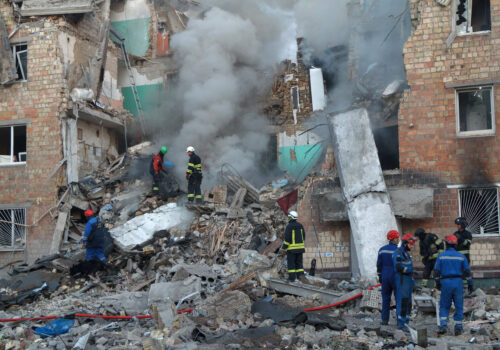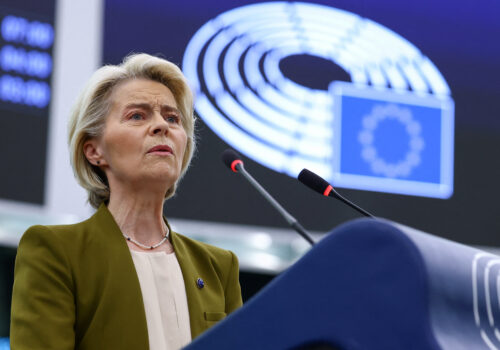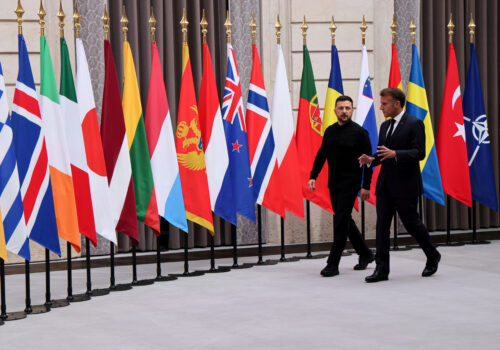Dispatch from Kyiv: Why so many Americans support—and should continue to support—Ukraine
The following is adapted from a speech former US Ambassador to Ukraine William B. Taylor gave at the Kyiv-Mohyla Academy in Ukraine on September 1, 2025. It is printed here with permission.
Today, Ukraine is three and a half years into the worst fighting Europe has seen since World War II, and that’s not counting the time since Russia’s initial invasion in 2014. In 2022, Ukrainians repelled the Russian invaders’ massive attack, pushed Russian forces back, and for the past two years have fought to a virtual standstill. Yes, Russia is grinding out small advances, at great cost in soldiers’ lives, but the Kremlin is not making substantial gains. Ukrainian soldiers have stopped the invader. In 2023, Russian forces illegally occupied 18 percent of Ukraine; two years later and at horrific cost, they illegally occupy 19 percent. The Russians are not winning.
Ukrainians have earned the respect and admiration of the Western world. Europeans know that they are defending them from Russia. Americans know that they are defending Western values and are fighting one of the United States’ two main adversaries. Many Americans see how Ukrainians have resisted the Russians and support them in their fight. We, Americans, have seen how Ukrainians innovate, how they improvise, how they resist, how they suffer, how they endure, how they defend their country and their values. We haven’t had to fight for our existence and our values in this way since World War II. Ukrainians are an inspiring example to Western democracies around the world. Let me tell you a bit about why Americans support Ukrainians in this terrible war.
Over the past three and a half years, I have spoken to thousands of Americans all over the United States—in small towns and big cities, in community colleges and Ivy League universities, in town halls, community centers, on Zoom and in person. We discuss Ukraine and the US role in supporting Ukraine in its fight.
In those discussions with Americans across my country, I hear four broad reasons why they support Ukraine. First and most passionately, they express outrage at Russian atrocities and war crimes. It’s just wrong to kill civilians, to kidnap children, to torture people, to attack apartments, hospitals, schools, churches. Americans, who know Ukraine was attacked without provocation, are deeply offended by the criminal, amoral actions of the aggressor.
Americans demand accountability for these war crimes, these crimes against humanity. Many call it genocide. Many Americans support international efforts to establish a war crimes tribunal, an international court to hold Russian President Vladimir Putin and his officials accountable for their crime of aggression against Ukraine. Americans are sure that, if no one is held accountable for these crimes, they will happen again.
Some Americans support Ukraine for geopolitical reasons. Russia’s attacks on Ukraine since 2014 and in 2022 violate the norms, principles, treaties, and commitments that all nations had made to one another since World War II that had kept the peace among major powers in Europe. These norms and commitments had provided the framework within which nations dealt with each other. This framework, this order, obliged all nations to respect the sovereignty of all other nations, to respect the internationally recognized borders, to resolve disputes peacefully.
Some Americans—but not enough—remember that in 1994, Ukraine gave up the third-largest arsenal of nuclear weapons in the world in exchange for a guarantee that its sovereignty and territorial integrity would be assured. The Budapest Memorandum was signed by the United States, the United Kingdom, Ukraine, and Russia. It was an important part of the international order that helped keep the peace in Europe. That commitment, like all the other treaties the Soviet Union and then Russia signed, was grossly violated in 2014 and most violently in 2022. Ukrainians will not accept weak security guarantees again.
It was that erosion of the international order that was the subject of a book written by the American scholar Robert Kagan titled The Jungle Grows Back. He describes the period between 1945 and 2014 as a small garden in the long history of the lawless jungle of international relations. In that short window, world economies grew, freedoms expanded, major wars were avoided. Of course there were conflicts—Korea, Vietnam, Yugoslavia, many others. But there was no third world war—no small achievement.
But gardens require constant upkeep—maintaining postwar institutions such as the United Nations, NATO, the World Trade Organization, the World Bank, and the International Monetary Fund. It also requires punishing violations of sovereignty, as an international coalition did when Saddam Hussein invaded Kuwait. A garden needs to be tended—weeds pulled, vines chopped—or the jungle will grow back.
If Russia gets away with invading its neighbor, annexing territory, subjugating citizens of another nation, then the order that kept the peace among great powers in Europe since 1945 will be severely damaged or destroyed. If we want to restore some version of that post-war order, Russia must lose, and Ukraine’s sovereignty and territorial integrity must be restored.
A third reason Americans tell me they support Ukraine is security—security for Europe, the United States, and American soldiers. If Russia were to succeed in Ukraine, then Putin wouldn’t stop there. He would threaten NATO allies and all of Europe. Americans don’t understand Russia as well as Europeans do. I listen to the Finns, the Estonians, the Poles, the Ukrainians—people who have lived next to Russia for generations. They have taught most of us Americans that Russia is a persistent threat to all its neighbors, and it has been for three centuries.
When European leaders, including Ukrainian President Volodymyr Zelenskyy, came to Washington last month, they emphasized to US President Donald Trump the need for Ukraine to prevail. Their presence demonstrated that stopping Russia in Ukraine is a European security imperative. And thus, it is an American imperative. Europe is a vital strategic interest for the United States—for all the reasons we well understand: economic, security, cultural, historical. Russia is the most immediate threat to Europe and to US security. For that reason, after World War II, NATO was established to defend Europe and the United States from the Soviet Union. In the first instance, this was by being strong enough to deter any attack from the Soviet Union and now Russia. But, if necessary, it was also to fight and defeat the adversary. The United States has stationed soldiers in Europe to demonstrate its commitment to that Alliance. Most immediately, US soldiers help deter Russia on NATO’s eastern flank. Those soldiers, their families, and most Americans want Ukrainians to succeed in stopping Russia from advancing further west. So, the United States provide weapons and money to help.
Fourth, China. Many Americans see China as the major threat to our country. I actually disagree—I think it’s Russia. But even most of those who fear China strongly support US assistance to Ukraine. They know that Chinese President Xi Jinping is watching how the West supports Ukraine, figuring that if it doesn’t support Ukraine in the face of Russian aggression, it might not support Taiwan in the face of a Chinese move on that island. By the way, some of the strongest supporters of Ukraine are Japan, South Korea, Australia, and the Philippines—for exactly that reason.
This is what I hear from Americans—anger at Russian atrocities, a hope that Ukrainian success can restore an international order that keeps international peace, a concern that Russian advances directly threaten US soldiers and allies, and a worry that Russian success could encourage Chinese aggression.
Ukrainians decide
When I arrived here in 2006, Ukrainians were still basking in the afterglow of the Orange Revolution, Viktor Yushchenko was president, expectations were high, Europe beckoned. But Ukraine was not united. While a pro-European president sat in Bankova, a significant number of Ukrainians still sought to align with Russia. Indeed, the second-largest political party in the country at the time—the Party of Regions—was unabashedly pro-Russia. It opposed NATO membership for Ukraine, and it wanted Ukraine to join Eurasian, not European, economic and security organizations.
At that time Europeans, too, were skeptical of Ukrainian commitment to the West. They blocked Ukraine’s first application to join NATO. The Bush administration believed—and many Americans still believe—that a free, democratic, market-oriented, secure Ukraine was vitally important to the United States and to its allies in Europe. The administration was willing to support Ukraine as it developed Western democratic, security, and economic institutions. It supported Ukraine’s application to join NATO and, for what it was worth, the European Union. At the embassy, US officials clearly understood that Ukrainians—and only Ukrainians—would decide their path. After all, it was a US president who in 2008 pushed very hard to get Ukraine started on a path to NATO. President George W. Bush—who had sent me to Kyiv—stopped here on his way to the NATO Summit that year in Bucharest, where the question of NATO membership for Ukraine and Georgia was on the agenda. He came here because he wanted to be able to convince the European leaders when he got to Bucharest that NATO should approve Ukraine’s application. The Germans and the French said no. Ironically, today most European nations support Ukraine in NATO, and the US government opposes it, at least for now.
Ukrainians would decide: European or Eurasian values.
Ukrainians would decide: democracy or autocracy.
Ukrainians would decide: individual freedom or nationalist ideology.
These were—and still are—Ukrainians’ decisions to make, not the United States’ or anyone else’s. If, however, Ukrainians chose Western values, democracy, and individual freedom, the West would be there to help. The Revolution of Dignity confirmed Ukrainians’ decisions—Europe was their destination.
Ukrainians made progress toward that goal during Petro Poroshenko’s presidency, even as the Russians occupied Crimea and Donbas and fomented and fought a conflict that took 14,000 Ukrainian lives. In 2019, Zelenskyy vowed to end that war and fight corruption, and Ukrainians elected him in a landslide. I arrived back to Kyiv as the new president was inaugurated and watched him grapple with both challenges—the Russians and corrupt oligarchs.
Zelenskyy initially thought that he could end the war with a face-to-face meeting with Putin. He soon concluded that wouldn’t work. Similarly, five years later, Trump thought he could end the war in twenty-four hours. Until last month, he had concluded that won’t work. But now a meeting between Zelenskyy and Putin is being discussed again, possibly followed by a three-way meeting adding Trump. Hopes, however, are not high.
In my observation, Russia’s full-scale invasion in February 2022 finally united Ukrainians, once and for all. The divisions I had seen in 2006 were gone. The whole world watched in awe as Ukrainians defended themselves, their army stopping the Russians on the outskirts of Kyiv and pushing them back toward where they came from; their president staying in Kyiv and asking for ammunition, not a ride. When Ukrainian soldiers drove the Russians out of Bucha and other cities and discovered the terrible crimes Russian soldiers committed against Ukrainian civilians, the civilized world was horrified. When Ukrainian forces sank the flagship of the Russian Black Sea fleet, many around the world cheered. The response of Ukrainian defenders on Snake Island to the Russian warship’s demand that they surrender ricocheted around the world. Ukrainian security service’s audacious drone strike on Russian airfields and bombers many miles inside of Russia earlier this summer was hailed as a triumph of Ukrainian ingenuity and skill. At unbearable cost in lives, Ukrainians have held off the Russian invasion. Many Americans support Ukrainians and fly Ukrainian flags in solidarity. Like Ukrainians, they want this war to end in a just and lasting peace.
An end to the fighting
The elements of an end to the fighting might now be coming into view. First, there must be a cease-fire. Months ago, Trump and Zelenskyy agreed on a thirty-day cease-fire on land, in the air, and on the sea. Trump made the proposal to Putin, and Putin rejected it.
That Putin is the obstacle to a cease-fire and an end to this war has now become clear to Trump. Moral outrage over nightly attacks on civilians played a role in his change of mind. In order to pressure Putin to the negotiating table, Trump in July resumed supplying US weapons to Ukraine through NATO allies.
This was a strong signal to Putin that he cannot wait the United States out. Trump seemed to waver in Anchorage last month. But Putin’s brutality may convince him again that the Russian leader is not serious about ending his war on Ukraine. European leaders, including Zelenskyy seem to have steadied Trump in support of a cease-fire.
Trump had also vowed to put more and harsher sanctions on Russia and any nation that buys oil and gas from Russia. He followed through with 50 percent tariffs on Indian exports to the United States. Either Putin comes to the table and negotiates a cease-fire, or sanctions go into effect. To avoid crippling secondary tariffs, India and potentially China have a choice: stop buying Russian oil and gas or demand that Putin negotiate a cease-fire with Ukraine.
With a cease-fire, the European-led “Coalition of the Willing” with US support can deploy forces into Ukraine to enforce the cease-fire and stand behind the Ukrainian military, as it defends its borders and the cease-fire line. The European Union can continue to lead the support effort, and it should use the $300 billion in blocked Russian assets now sitting in European banks to pay for that effort. These funds should go to Ukraine, so that for the next three years, it will have the funds to purchase the weapons it needs to defend itself and to rebuild its country when the fighting stops.
With a cease-fire in place, Ukraine can continue on its path to European Union and NATO membership. It can resume normal democratic activities—political debate, freedom of the press, elections. It can continue to strengthen its military with NATO-compatible formations and Western weapons from NATO nations, including the United States.
In my view, Ukraine should be in NATO. The security provided by the European-led “Coalition of the Willing” is a good start. But a more effective, tested, and experienced military force, designed specifically to deter the Russians, is NATO.
With a cease-fire in place and a security guarantee to deter further Russian aggression, negotiations toward a long-term settlement could begin. I am not optimistic that such negotiations would be successful. Ukraine demands sovereignty, return of occupied territory, accountability for Russian war crimes, compensation for war damage, and the return of all children, prisoners of war, and civilians held in Russia. Putin demands the occupied Ukrainian territories, neutrality, and disarmament. The Russian demands are so unrealistic and unacceptable to Ukraine and its allies that I don’t see an agreement. There might, however, be a useful historical precedent: the two Koreas have never been able to agree on a formal peace treaty, but that has not kept South Korea from developing its democracy and economy and entering into a binding security agreement with the United States. Ukraine could do the same.
I am sure that Ukraine will never give up legal claim to all of its territory, as defined by its internationally recognized 1991 borders. Ukraine might reluctantly agree, for now, temporarily, as West Germany did after World War II, that it will not use military force to push the Russians out of the 19 percent of Ukrainian land that they now illegally occupy. Like the West Germans then, Ukrainians are convinced that they will someday reclaim all their territory. Until that time, no one should recognize Russia’s illegal claim to Ukrainian land.
This American, like most Americans, has enormous respect for Ukraine and Ukrainians. They have earned the admiration of my country and other Western nations. They have earned their place in the European Union and NATO. They have defended their right to live and thrive independently, free from threats from their neighbor. I am convinced that they will prevail.
William B. Taylor is a distinguished fellow with the Atlantic Council’s Eurasia Center. Prior to the Atlantic Council, Taylor was vice president, Europe and Russia at the US Institute of Peace. He served as the US ambassador to Ukraine from 2006 to 2009 and as the chargé d’affaires ad interim from 2019 to 2020 at the US Embassy in Kyiv.
Further reading
Wed, Sep 3, 2025
Dispatch from Kyiv and Warsaw: Security is the first answer to Russia’s aggression
New Atlanticist By Shelby Magid, Mercedes Sapuppo
A visit to the capitals of Ukraine and Poland puts recent diplomacy in Moscow, Anchorage, and Washington to end Russia’s war in Ukraine in perspective.
Thu, Sep 11, 2025
Von der Leyen’s stirring message to Europe: Fight to survive
Inflection Points Today By Frederick Kempe
“Europe is in a fight,” the European Commission president said during her State of the Union address in Strasbourg on September 10.
Thu, Sep 4, 2025
Twenty-six European countries have committed to help defend Ukraine after the war. What’s next?
Fast Thinking By
Our experts share their perspectives on what the commitments that members of the Coalition made on Thursday will mean for Ukraine’s security.
Image: A US flag flies at a makeshift memorial to fallen defenders of Ukraine, near the Independence Monument, amid Russia's attack on Ukraine, at the Independence Square in Kyiv, Ukraine August 20, 2025. REUTERS/Valentyn Ogirenko



